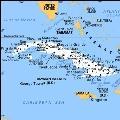After years of tension between the 2 nations, President Barack Obama has called for the United States to develop a new relationship with the Republic of Cuba. Policy shifts have been made on issues relating to communications with and family travel to the island nation.
Discussions will soon begin between officials of our 2 countries on issues such as migration, direct mail and law enforcement cooperation, while keeping in mind the legitimate aspirations and human rights of the Cuban people.
At the recent Assembly meeting of the Organization of American States in Honduras, the U.S. took another step in this new engagement. It joined with other member-states in supporting a consensus resolution that lifts Cuba's 47-year suspension from the OAS provided that Havana seeks to re-enter the organization. The resolution establishes a path forward for Cuba's re-entry that will be defined by the principles of the OAS that defend democracy and human rights. Secretary of State Hillary Clinton, who helped negotiate the measure, called the resolution a consensus that focuses on the future instead of the past. Honduran President Manuel Zelaya and other hemispheric leaders hailed the decision as well.
The United States looks forward to the day when a democratic Cuba rejoins the inter-American system. Until then, we will seek new ways to engage Cuba that benefit the people of both nations and the hemisphere. We will continue to advocate for democratic governance in Cuba and throughout the Americas. The people of the hemisphere look to the OAS to do the same.
Further change in this direction now rests in Cuba's hands, for the benefit of the Cuban people and the region.

